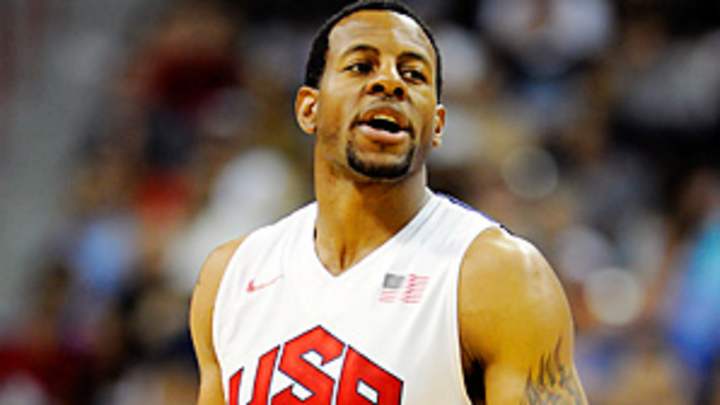Extra work that benefited Iguodala now set to bolster Olympic team


WASHINGTON -- Andre Iguodala's strength as a defender has not been acquired easily.
"Probably one thing that I do that no one else does, I do defensive drills in the summertime,'' he said after U.S. men's Olympic team practice Saturday, 15 days before the opening game in London. "I go through a set of (defensive) slides a few times per day. And I'm sitting in a defensive stance for a minute straight. So I just try to prepare myself mentally for what I have to go through to help the team out.''
His team, in this case, is trying to be the best in the world.
"You get used to it,'' he said of his defensive work. "It's a (expletive) the first week, from the fact, well, why am I doing this? But when I'm on the court getting steals, and I'm all over the place and I'm not tired -- then you know where it's from.''
The U.S. is benefiting from the extra work. The 6-foot-6 76ers swingman wasn't invited to the Olympics until last week, when he was awarded one of the last three spots on the 12-man U.S. roster. Instead of filling in around the edges of the bench, his aggressive defense looks as if it will help define the team.
"Getting out on the wings,'' said Iguodala with an affirming nod, "and pressuring the ball and creating turnovers. We're so athletic, we got to get out, and we've got to run. Teams are going to try to slow us down, so defensively is where we have to make it happen.''
That will be Iguodala's intent when the U.S. plays its second pre-Olympic exhibition here Monday against Brazil, a medal contender led by NBA rivals Nene, Anderson Varejao and Leandro Barbosa. Iguodala joined with Russell Westbrook to establish his own country's defensive style Thursday at Las Vegas in the opening U.S. exhibition win over the Dominican Republic, which for several telling possessions was unable to advance the ball past midcourt against the American pressure.
That style is a necessity because of the injuries that have robbed the U.S. of its size around the basket. A medal contender like Spain cannot be allowed to play in the half-court and feed the Gasol brothers, Pau and Marc. The Brazilians also revolve around their big frontcourt of Varejao and Nene.
Iguodala is here to help fill the need for a frantic pace and an open-court game that not only affirms the U.S. athleticism but also masks its deficiency of size. At 6-6 he can and will guard every position on the floor over the course of the Olympic tournament. Most players in Iguodala's role would talk about the sacrifice they'd be making to fill such a large defensive role.
But Iguodala views his Olympic mission as a kind of self-fulfillment. "My job is kind of easy,'' he said. "I try to make the game easy for those superstars.''
He was referring to LeBron James, Dwyane Wade, Kobe Bryant and Carmelo Anthony -- the same stars he guards routinely and effectively during the NBA season. Now he is serving them, which is something he was always meant to do. Iguodala grew up in Springfield, Ill., where his idol was Scottie Pippen. Twenty years ago, Pippen played the defensive role for the Dream Team that Iguodala is playing today.
"I was called 'Scottie Pippen' at a young age,'' Iguodala said. "People compared me to him -- and to Penny Hardaway. Our games were similar, and I tracked him the whole way.''
Iguodala compared his stats to Pippen and found similarities. Neither he nor Pippen was a prolific scorer. Both sought to help their NBA teams in a variety of areas at both ends of the court. The big difference between them, obviously, was that Pippen was asked to supplement Michael Jordan, whereas Iguodala has been the 76ers' best player since Allen Iverson was traded away in 2006.
Over the years he has been criticized in Philadelphia for not being a franchise star. That was not the role Iguodala was cut out to play, though he acknowledges that the frustrations of the 76ers fans have toughened him.
"When you're not winning as much, or you're not playing to someone's certain expectations, it can be a tough city to play in,'' he said. "Especially shooting the ball. I shot (39.4 percent last season) from the three, and you still get to get criticized for missing a shot. You've got to keep pulling the trigger and keep playing.
"But when you're winning, it's really rewarding. So I've just got to continue to strive to get better and hope we improve as a team.''
Iguodala is peaking at age 28. He led the eighth-seeded 76ers to a Game 7 at Boston in the second round of the playoffs, and now he has earned a chance to pursue an Olympic gold medal two years after helping the U.S. win the world championship in Turkey. His role with the national team helped buffer him from the recent moves of the 76ers, who lost leading scorer Lou Williams to free agency (signed with Atlanta) and power forward Elton Brand to amnesty (picked up by Dallas). Iguodala deflected questions about his franchise amid persistent speculation of recent years that he, too, will be moved.
"I haven't really sat down and thought about it too much,'' he said of the 76ers' roster. "My focus and energies have really been on the USA team and helping this team try to win games.''
His current job is enough to keep him occupied. Or rather, to occupy the opposing backcourt.
